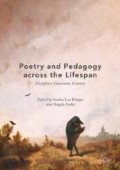Abstract
Studies continue to demonstrate that many people are dismayingly (and increasingly) unable to distinguish dubious from credible sources. This, coupled with the fact that a majority of Americans get their news from social media, reinforces the need for educators to help their students acquire a versatile set of literacy practices. This chapter proposes, first, that poetry is a beneficial site for developing and refining these practices, and, second, that analyzing poems through the lens of the poetic turn is a robust method for doing so. With reference to the critical work of John Crowe Ransom, Ellen Bryant Voigt, Michael Theune, and Randall Jarrell, this chapter calls for more instructional attention to be paid to structural elements of poems, as this attention will help students build confidence in analyzing poetry while attuning them to the linguistic and rhetorical subtleties necessary for sorting reliable information from streams of dubious data.
Access this chapter
Tax calculation will be finalised at checkout
Purchases are for personal use only
Notes
- 1.
Though other New Critics invoked structure as well, no others were able to establish its function and operations with such clarity and rigor. Cleanth Brooks was onto it when he noted that the structure is “the ordering of the material,” which is also “the solution” (1947, 194) of the problem the poem sets out to solve or pose, but he omitted the essential complement of texture that Ransom knew, wisely, was just as critical to the poem being poetic.
- 2.
It is important to note, however obviously, that haikus and sonnets come to us from vastly different cultural spaces and traditions and utilize formal patterns which do not necessarily translate from one to the other: the haiku dispenses completely with rhyme and repetition and, though it stipulates line length, it does so without stipulating a meter—just a syllable count. However, the turn is common to these poems and allows us to consider the harmony of structure and form, and not the poem’s deployment of historically-vetted, monocultural formal elements, as an important condition of any poem’s formation. By approaching poems at their points of commonality—i.e. the turn—we are better able to place different poetic traditions in conversation and not in opposition—an important component of multicultural, civic literacy.
- 3.
Solmaz Sharif, “Vulnerability Study,” from Look. Copyright © 2016 by Solmaz Sharif. Reprinted with permission of The Permissions Company, Inc., on behalf of Graywolf Press. www.graywolfpress.org.
References
Bonta, Dave. 2009. Between Dream and Metaphor: Haiku of Yosa Buson. Via Negativa (blog), December 6. http://www.vianegativa.us/2009/12/between-dream-and-metaphor-haiku-of-yosa-buson/.
Brooks, Cleanth. 1947. The Well Wrought Urn: Studies in the Structure of Poetry. New York: Harcourt, Brace and Company.
Gottfried, Jeffery, and Elisa Shearer. 2016. News Use Across Social Media Platforms 2016. Pew Research Center. http://journalism.org/2016/05/26/news-use-across-social-media-platforms-2016/.
Greene, Roland, Stephen Cushman, Clare Cavanagh, Jahan Ramazani, Paul Rouzer, Harris Feinsod, David Marno, and Alexandra Slessarev. 2012. The Princeton Encyclopedia of Poetry and Poetics. 4th ed. Princeton, NJ: Princeton University Press.
Jarrell, Randall. 2002. Levels and Opposites: Structure in Poetry. Georgia Review 56 (1): 389–404.
Lerner, Ben. 2016. The Hatred of Poetry. New York: Farrar, Straus and Giroux.
Matejka, Adrian. 2017. Map to the Stars. New York: Penguin.
Ransom, John Crowe. 1984a. Criticism as Pure Speculation. In Selected Essays of John Crowe Ransom, ed. Thomas Daniel Young and John Hindle, 128–146. Baton Rouge: Louisiana State University Press.
———. 1984b. Wanted: An Ontological Critic. In Selected Essays of John Crowe Ransom, ed. Thomas Daniel Young and John Hindle, 147–179. Baton Rouge: Louisiana State University Press.
Shakespeare, William. 2017. Sonnet 29: When, in Disgrace with Fortune and Men’s Eyes. Poetry Foundation. http://poetryfoundation.org/poems/45090/sonnet-29-when-in-disgrace-with-fortune-and-mens-eyes/. Accessed 9 Aug 2017.
Sharif, Solmaz. 2016. Look. Minneapolis, MN: Graywolf.
Stanford History Education Group. 2016. Evaluating Information: The Cornerstone of Civic Online Reasoning. Stanford University. http://stacks.stanford.edu/file/druid:fv751yt5934/SHEG%20Evaluating%20Information%20Online.pdf/. Accessed 25 July 2017.
Theune, Michael, ed. 2007. Structure and Surprise: Engaging Poetic Turns. New York: Teachers and Writers Collaborative.
Voigt, Ellen Bryant. 1999. The Flexible Lyric. Athens: University of Georgia Press.
Wineburg, Sam, and Sarah McGrew. 2016. Why Students Can’t Google Their Way to the Truth. Education Week. http://edweek.org/we/articles/2016/11/02/why-students-cant-google-their-way-to.html/. Accessed 25 July 2017.
Wright, James. 2007. Collected Poems. Middletown: Wesleyan.
Author information
Authors and Affiliations
Editor information
Editors and Affiliations
Rights and permissions
Copyright information
© 2018 The Author(s)
About this chapter
Cite this chapter
Bracken, C. (2018). Expanding the Turn: Using Poetry to Prepare Students for a Post-Truth World. In: Kleppe, S., Sorby, A. (eds) Poetry and Pedagogy across the Lifespan. Palgrave Macmillan, Cham. https://doi.org/10.1007/978-3-319-90433-7_16
Download citation
DOI: https://doi.org/10.1007/978-3-319-90433-7_16
Published:
Publisher Name: Palgrave Macmillan, Cham
Print ISBN: 978-3-319-90432-0
Online ISBN: 978-3-319-90433-7
eBook Packages: EducationEducation (R0)

